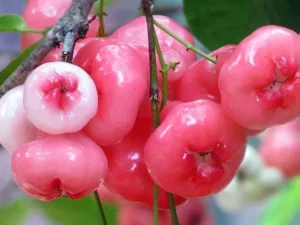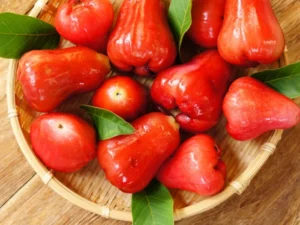The Java apple tree is an evergreen tree that bears delicious red fruits. The fruits are also known as “wax apples” due to their waxy look and brilliant red color when mature. They are used to produce sauces and are stewed with normal apples in Malaya.
Syzygium samarangense is a flowering plant of the Myrtaceae family native to the Greater Sunda Islands, the Malay Peninsula, and the Andaman and Nicobar Islands, although it was introduced to a wider region in ancient times and is now extensively spread across tropical places.
This nutritious fruit offers multiple health benefits. Apples may lower your risk for cancer, diabetes, and heart disease. Research says apples may also help with weight loss while improving your gut and brain health.
Description
- Syzygium samarangense is a tropical tree with evergreen leaves 10-25 centimeters (4-10 in) long and 5-10 centimeters (2-4 in) broad that can reach a height of 12 meters (39 ft). The leaves are elliptic in shape, but circular at the bottom; when crushed, they exude a lovely aroma. The trunk is quite short, with a large – yet open – crown that starts low on the tree. The tree’s bark is pink-grey in color and easily peels.
- The flower is white-yellow-white in hue, 2.5 cm (1 in) in diameter, with four petals and many stamens. They appear as 3 to 30 spikelets at the apex of the branch. The resulting fruit is a delightful berry in the shape of a bell that ranges in color from whitish to light greenish, or greenish to reddish, purple, reddish, deep purple, or black. The fruit of wild plants is 4-6 centimeters (1.6-2.4 in) long and contains four fleshy calyx lobes at the tip.
- The skin is thin and the flesh is white and spongy. Each fruit has 1-2 spherical seeds that are around eight millimeters in diameter (0.3 in).
- Flower and fruit development is not limited to the axils of the leaves, but can occur on virtually any portion of the trunks and branches. When completely grown, the forest is known as a heavy bearer since it may produce up to 700 apples.
- When the fruit is fully grown, it will inflate outward and have a little concavity in the middle of the “bell.” Wax apples with a subtle gloss are better and healthier. Despite its name, when ripe it looks like an apple from the outside. It does not taste like a regular apple.
- It also lacks the fragrance and firmness of an apple. It has a taste similar to a snow pear and a liquid-to-flesh ratio close to a watermelon. This mesh is edible, but it lacks flavor. Its juice varies in color according to the cultivar; it might be reddish or even white.
The seeds and the Java apple
Java apples are not well-known fruits in Nigeria and other areas of the world. Those who are familiar with this fruit refer to it as a local apple or wax apple. It is a seasonal fruit, but even when it is available, it is difficult to find.
One thing I’ve seen is that many people mix up Java apple (Syzygium samarangense) with watery rose apple (Syzygium aqueum).
One time, I chose a java apple over a watery rose apple. What drew my attention was the difference in taste. The taste was unusual, but I’m glad it made me look for explanations.
- In Indian Ocean island cuisine, the fruit is commonly used in salads and lightly sautéed dishes.
- It is usually eaten as a fruit, but it is also used to make pickles (chambakka achar). It is known as macopa in the Philippines (before colonization, it was known as ‘dambo’). Because of its similar appearance, it is frequently mistaken with tambis (Syzygium aqueum), despite the fact that the latter is far more commonly cultivated.
- Java apple (Syzygium Samarangense) belongs to the Myrtaceae family, Genus Syzygium, and Specie Samarangense. Within the same family and genus as;
- Malay apple (Syzygium malaccense)
- Watery rose apple (Syzygium aqueum)
- Rose apple (Syzygium jambo)
Note: There are over 1200 species of this fruit(apple) and you can easily confuse one over another.
Differences between java apples and watery rose apples?


They may bear a passing similarity. They are, for example, bell-shaped, but they also have certain distinguishing characteristics.
- A watery rose apple is shorter and lighter in body weight, but a java apple is longer and denser.
- Watery rose apple has a softer texture than java apple, with a little sheen or waxy flesh.
- Java apple is a regular pink color, but watery rose apple has a lighter pink color. I’ve also eaten some watery rose apple with mild purple shades.
- In terms of flavor, java apple is juicy, sweet-sour, and mushy, similar to cashew or an old apple. Watery rose apple, on the other hand, is juicier, tastes bland, and crisp like a fresh apple.
Another contrast is the size of the seeds. The seed size of the Java apple is bigger than that of the watery rose apple.
Nutritional Value of Java Apple
Despite the fact that this fruit is mostly water, it has some nutrients. It is low in calories and high in protein, dietary fiber, citric acid, phosphorus, potassium, vitamin A and C, and other nutrients.
The water apple is a low-caloric fruit due to its low fat and calorie content and high water content, which is approximately 90%.1 The nutritional value of water apple is as follows:
| Nutrient Component | Value/ 100 g |
| Energy | 25 kcal |
| Carbohydrates | 5.7 g |
| Proteins | 0.6 g |
| Fats | 0.3 g |
| Calcium | 29 mg |
| Magnesium | 5 mg |
| Iron | 0.07 mg |
| Potassium | 123 mg |
| Phosphorus | 8 mg |
| Zinc | 0.06 mg |
| Manganese | 0.029 mg |
| Copper | 0.016 mg |
| Vitamin B1 | 0.02 mg |
| Vitamin B2 | 0.03 mg |
| Vitamin B3 | 0.8 mg |
| Vitamin A | 17 µg |
Health Benefits of Java Apple
The health benefits of java apple include reduced incidence of stroke, increased immunity, and increased metabolic activity. The wax apple can also relieve constipation and muscular spasms, as well as moisturize the skin.
1. Maintain blood sugar levels
One of the health benefits of Java apple is its low sugar and calorie content. It includes Jambosine, an alkaloid found in Java apples and other plants. Jambosine aids in the balance of starch-to-sugar conversion in the body. As a result, it delays the release of sugar into the blood.
2. It reduces inflammation.
Fruits having anti-inflammatory qualities are in great demand. This is because it helps to decrease inflammation in the body, including inflammation that can lead to cancer or tumors.
Vescalagin, found in Java apples, has anti-inflammatory properties. Furthermore, vitamin C is a potent antioxidant that protects the body’s organs and cells from the destructive effects of free radicals.
3. Improves hydration
Although Java apple is not as juicy as the water rose apple, it provides enough juice to satisfy taste. As a result, consuming it alone helps keep you hydrated and balance fluid loss.
You may also use it in other hydrating dishes such as smoothies and drinks. It’s considerably superior to a can of soda.
4. Acts as a detox
Aside from the water content that aids in the removal of impurities, java apple also includes minerals and vitamins that aid in this process.
It includes vitamin C and potassium, both of which have diuretic properties. As a result, it aids in the efficient elimination of toxins from the liver and kidney.
5. Boost immunity
Because of the high concentration of vitamins and minerals in fruits, they can help increase immune function. These vitamins are abundant in Java fruit.
As a result, it can aid to boost the immune system. It aids the immune system in fighting off illnesses and infections such as the flu. It also reduces the likelihood of having them.
6. Minimizes constipation
Inadequate hydration intake is one of the underlying causes of constipation. As a result, the moisture content of the java apple can aid in providing the body with adequate fluid to soften the stool.
Furthermore, other health benefits of java apple are its high fiber and phytochemical contents which aids digestion. The digestive system can then function normally.
See more @ Bloomhood
Uses & Benefits of Java apple (wood and leaves inclusive)
Java apple tree wood can be utilized for light building projects such as huts. The leaves can help decrease and even eliminate migraines. It is beneficial to boil the tender leaves and consume the extracts.
This plant’s blooms contain tannin, which accounts for its astringency. As a result, it can cure fever since it aids in the fight against pathogenic microorganisms in the body. This is an admirable health benefits of java apple.
This fruit’s deliciousness extends to its culinary applications. It may be used to make delicious pickles or sauce. You may even turn it into wine or another hydrating beverage.
Benefits of Water Rose Apples
The water rose apple includes a variety of bioactive chemicals that may have a variety of biological qualities that are beneficial to human health.
Water rose apples may have the following characteristics:
- It might have antioxidant properties (It may fight free radicals).
- It may have antifungal properties.
- It may have anti-inflammatory effects.
- It helps in reducing blood sugar levels.
- It has some antibacterial properties.
- It is thought to have anti-inflammatory effects.
- It may have anti-proliferative (slowing the spread of malignant cells) properties.
- It could also help in lowering cholesterol.
Possible Side Effects of Water Rose Apples
There have been no rigorous studies on the adverse effects of water rose apples. As a result, additional research is needed to confirm the negative effects of water rose apples on human health.
However, if you have any negative effects or pain after consuming water apples, please contact your physician who recommended the herb. They will offer the necessary therapy to lessen the negative effects. You may be allergic to it and not aware and in such case desist immediately.
Eat in moderation. The water rose apples are harmless until you start eating them excessively. We don’t have sufficient data to recommend the safe use of water apples for pregnant or nursing women. As a result, it is very important to see a doctor before taking it.
Because small children and the elderly have weakened immune systems, it is important to take extra measures while administering it to them.
There is insufficient scientific data to suggest that water apple interacts with other drugs. People should not, however, believe that no adverse interactions.

